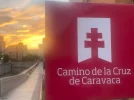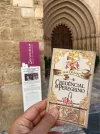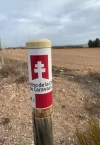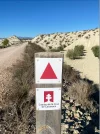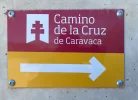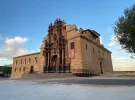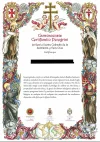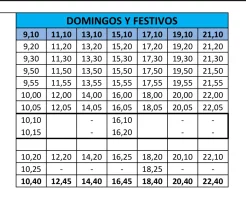gollygolly
Active Member
- Time of past OR future Camino
- 2000/13/14/15/16/17/18/19/2021/22/23/24
Feeling the desire to be walking on a Camino, though also want to feel some autumnal warmth ? Willing to walk on a route that does not end at Santiago de Compostela ? Desiring to walk away from the crowds ? Then read on, as this about the Camino La Cruz de Caravaca.This particular write up is about the route that ommences in Orihuela and ends in Caravaca de la Cruz.
While in contemporary times it is not a very known Camino, in the Middle Ages the Camino La Cruz de Caravaca was a very important pilgrimage, and along with the Camino de Santiago, is the only pilgrimage route in Spain that has official recognition from the Vatican to issue a certificate of completion (known as the Caravaquensis) and also have recognition to have a Año Jubileo, a Holy Year. This year, 2024, is an Año Jubilar, with the next falling in 2031.
This article might interest :https://english.katholisch.de/artikel/55856-spains-holy-newcomer-among-the-tourist-cities
The practicalities first. From outside of Spain, the starting place of Orihuela can be reached by flights to Alicante or to Murcia.
The entirety of the close to 120kms of the route are very well way marked, and I believe that it would almost be a challenge to go adrift. In terms of how arduous a walk, this is not a difficult walk, with few ups and downs, as it is significantly flat. There are various standards of accommodation along the way, though there are no pilgrim albergues as are to be found on the Caminos leading to Santiago.
Do not expect to meet many pilgrims, as allegedly under 1000 walking pilgrims will complete the walk this year.
I made this walk in October 2024, and the stages that I made were these :
Day 1 : Orihuela
This is a charming town and well worth a full day of exploration. The Cathedral in Orihuela, as well as the Tourist Office [Calle Marqués de Arneva, 1] can provide the official Pilgrim Credential. Look for the iglesia de Santiago Apóstol, which has a stamp for the Credential.
Stay : There are a range of options, but recommend the Sercotel Palacio de Tudemir [https://www.sercotelhoteles.com/en/hotel-palacio-de-tudemir], which also has a very high standard restaurant, including a 'menu de dia' at a reasonable price.
Day 2 : Orihuela to Murcia
A very uncomplicated walk, which quickly leaves Orihuela behind and follows the River Segura the whole of the route through to Murcia. Murcia is a reasonably sized city with a beautiful Cathedral located not far from the River Segura. The City is well worth taking the time to explore.
Stay : Again, there is a range of options for all budgets, many located centrally near to the Cathedral
Day 3 : Murcia to Molina de Segura
This was another simple day in terms of the walk continuing to follow the River Segura and continuing to be stunningly well way marked.
Stay : Here there is the single hotel option of staying at the Hotel Villasegura, who offer a discounted rate for those with the Credential, along with a good breakfast available from early in the day. There are some apartments available in the centre of Molina de Segura, though my personal recommendation is to choose the Hotel Villasegura.
Day 4 : Molina de Segura to Mula
Stay : A few possibilities, including the beautiful 'La Casa de los Coy'[https://lacasadeloscoy.com/] in the town and the Hotel Rural El Molino de Felipe which is located further along the route, outside the town. In Mula I stayed at the Real Monasterio de la Encarnación (tel : 968 660 826) for 2 nights so as to maximise my experience of the Monastery and the town. While the Monastery is basic, there was a very warm welcome from the nuns, who are from Colombia. They can be seen singinging in this video :
Day 5 : Mula to Bullas
Stay : Again, there are a few possibilities, including an albergue at the camping site La Rafa [https://larafabullas.es]. I stayed at Pension Flipper [https://bullaspensionflipper.es/en/home] that gives a discount for those who have the credential.
Day 6 : Bullas to Cehegín
Cehegín is a beautiful town, still showing some of the past glory and wealth in the many buildings that reflect that at times in the past Cehegín was commercially important. In recent times some of the buildings have been restored and hopefully in the coming years some more of these architectural jewels will have life returned.
Stay : There are several possibilities for all budgets, though I strongly recommend Hostal HS Cehegin [https://hostalcehegin.es] and there is a discount for those with the Credential.
Day 7 : Cehegín to Caravaca de la Cruz
A relatively short distance separates Cehegín from the destination, Caravaca de la Cruz, and apart from the brief final climb up to reach the Basilica de la Vera Cruz de Caravaca, this is not a very demanding walk. At the reception centre located close to the Basilica, they will stamp the credential and issue the certificate of completion, the Caravaquensis.
Stay : There are a considerable number of apartments, hostels and hotels in Caravaca, though I suggest to stay at Hospederia Nuestra Señora del Carmen [[https://www.hospederiacaravaca.org] which is still to this day a working Monastery, originally founded in 1587 by St. John of the Cross.
Should you want to find yourself far from the mass crowds, this is a highly recommended Camino !
While in contemporary times it is not a very known Camino, in the Middle Ages the Camino La Cruz de Caravaca was a very important pilgrimage, and along with the Camino de Santiago, is the only pilgrimage route in Spain that has official recognition from the Vatican to issue a certificate of completion (known as the Caravaquensis) and also have recognition to have a Año Jubileo, a Holy Year. This year, 2024, is an Año Jubilar, with the next falling in 2031.
This article might interest :https://english.katholisch.de/artikel/55856-spains-holy-newcomer-among-the-tourist-cities
The practicalities first. From outside of Spain, the starting place of Orihuela can be reached by flights to Alicante or to Murcia.
The entirety of the close to 120kms of the route are very well way marked, and I believe that it would almost be a challenge to go adrift. In terms of how arduous a walk, this is not a difficult walk, with few ups and downs, as it is significantly flat. There are various standards of accommodation along the way, though there are no pilgrim albergues as are to be found on the Caminos leading to Santiago.
Do not expect to meet many pilgrims, as allegedly under 1000 walking pilgrims will complete the walk this year.
I made this walk in October 2024, and the stages that I made were these :
Day 1 : Orihuela
This is a charming town and well worth a full day of exploration. The Cathedral in Orihuela, as well as the Tourist Office [Calle Marqués de Arneva, 1] can provide the official Pilgrim Credential. Look for the iglesia de Santiago Apóstol, which has a stamp for the Credential.
Stay : There are a range of options, but recommend the Sercotel Palacio de Tudemir [https://www.sercotelhoteles.com/en/hotel-palacio-de-tudemir], which also has a very high standard restaurant, including a 'menu de dia' at a reasonable price.
Day 2 : Orihuela to Murcia
A very uncomplicated walk, which quickly leaves Orihuela behind and follows the River Segura the whole of the route through to Murcia. Murcia is a reasonably sized city with a beautiful Cathedral located not far from the River Segura. The City is well worth taking the time to explore.
Stay : Again, there is a range of options for all budgets, many located centrally near to the Cathedral
Day 3 : Murcia to Molina de Segura
This was another simple day in terms of the walk continuing to follow the River Segura and continuing to be stunningly well way marked.
Stay : Here there is the single hotel option of staying at the Hotel Villasegura, who offer a discounted rate for those with the Credential, along with a good breakfast available from early in the day. There are some apartments available in the centre of Molina de Segura, though my personal recommendation is to choose the Hotel Villasegura.
Day 4 : Molina de Segura to Mula
Stay : A few possibilities, including the beautiful 'La Casa de los Coy'[https://lacasadeloscoy.com/] in the town and the Hotel Rural El Molino de Felipe which is located further along the route, outside the town. In Mula I stayed at the Real Monasterio de la Encarnación (tel : 968 660 826) for 2 nights so as to maximise my experience of the Monastery and the town. While the Monastery is basic, there was a very warm welcome from the nuns, who are from Colombia. They can be seen singinging in this video :
Day 5 : Mula to Bullas
Stay : Again, there are a few possibilities, including an albergue at the camping site La Rafa [https://larafabullas.es]. I stayed at Pension Flipper [https://bullaspensionflipper.es/en/home] that gives a discount for those who have the credential.
Day 6 : Bullas to Cehegín
Cehegín is a beautiful town, still showing some of the past glory and wealth in the many buildings that reflect that at times in the past Cehegín was commercially important. In recent times some of the buildings have been restored and hopefully in the coming years some more of these architectural jewels will have life returned.
Stay : There are several possibilities for all budgets, though I strongly recommend Hostal HS Cehegin [https://hostalcehegin.es] and there is a discount for those with the Credential.
Day 7 : Cehegín to Caravaca de la Cruz
A relatively short distance separates Cehegín from the destination, Caravaca de la Cruz, and apart from the brief final climb up to reach the Basilica de la Vera Cruz de Caravaca, this is not a very demanding walk. At the reception centre located close to the Basilica, they will stamp the credential and issue the certificate of completion, the Caravaquensis.
Stay : There are a considerable number of apartments, hostels and hotels in Caravaca, though I suggest to stay at Hospederia Nuestra Señora del Carmen [[https://www.hospederiacaravaca.org] which is still to this day a working Monastery, originally founded in 1587 by St. John of the Cross.
Should you want to find yourself far from the mass crowds, this is a highly recommended Camino !
Attachments
Last edited:


